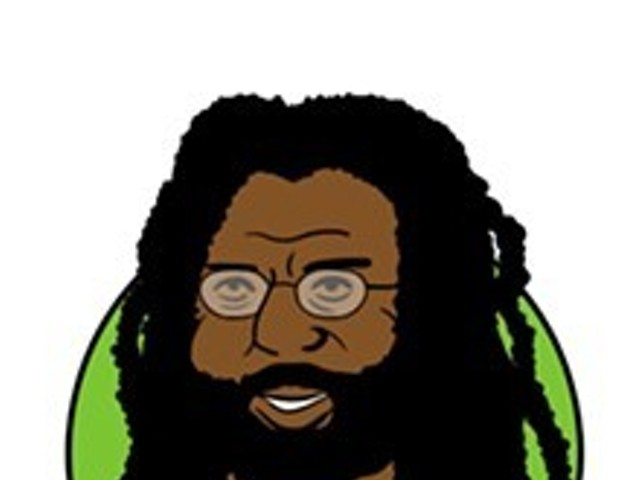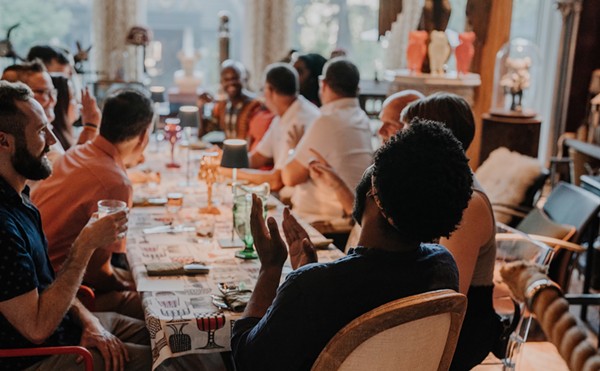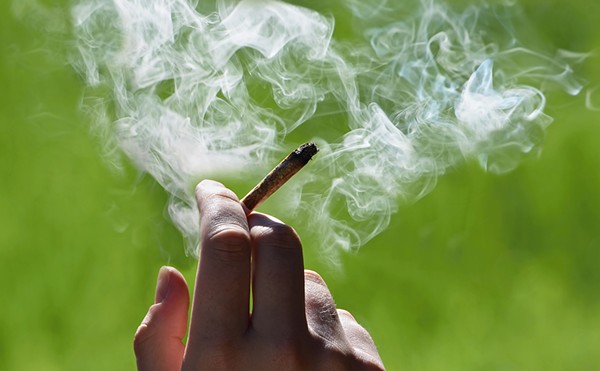When I was young the idea of taking communion was a pretty big deal. It was a key part of the Christian faith my family reared me in. I'm not sure what I expected ... but I believed that something was supposed to happen when I partook of the consecrated bread. After all, a part of Christ's body was entering me.
On the big day I was severely disappointed because I didn't feel anything. Nothing happened. I was not carried away on the wings of a dove nor did I feel particularly holy or filled with spirit.
It was not until years later that I encountered cannabis. Now that's a sacrament that does something you can feel.
There are many facets of cannabis — medical, recreational, industrial, and spiritual.
Mostly the marijuana activists don't talk about the spiritual side of the plant. A few years back when I quoted a local activist talking about his religious beliefs related to marijuana, other activists were upset. They don't think that bringing up that aspect aids their cause. That it sounds like a weird stoned guy ranting.
They're probably right. But that doesn't make the subject and people's beliefs go away. Scratch the surface of some marijuana users and you find a spiritual being. Detroiter Idris Nia, a Rastafarian, is one of them.
"In Jamaica I have participated in what are called "Groundation ceremonies," which involve passing the chalice, a coconut shell ganja pipe," says Nia. "For those of us who partake it is a kind of sacrament. We hail Rastafari as we light the joint or light the pipe."
Rastafari is the modern Afrocentric religious movement that emerged in Jamaica in the 1930s. Its beliefs, which are biblically rooted in the Coptic Church of Alexandria, include the use of ganja (marijuana) as a sacrament. Most popular associations of Rastafari include dreadlock hairdos and reggae music. Although Nia does wear locks and is a reggae DJ, his spirituality encompasses a fundamental relationship with the earth. He considers himself a naturalist, someone who believes in nature.
"When you go to Jamaica and the bushman takes up in the rainforest, he will show you that every plant has three purposes from a human perspective — nutritional, medicinal, and spiritual," he says. "And that is every plant. But that helps in realizing that the creator created ganja for a reason. We know scientifically that there are receptors in the brain that coincide with the marijuana molecule so that it's like we were made for each other."
Nia is referring to the cannabinoid receptors. While the majority of them are in our brains, cannabinoid receptors can be found throughout our bodies. Cannabinoids are the different chemicals in marijuana such as THC or CBD. Our bodies actually manufacture cannabinoids and some believe that this accounts for the state of mind referred to as the runner's high. I've got to tell you I've felt that. There was a time in my life when I would go out and run three miles just because it felt good.
It does seem that indeed humans and cannabis were made for each other. And this is something I try to say as often as possible. The reason why you can't die of a marijuana overdose is that the cannabinoid receptors are not in the part of the brain that controls heartbeat and breathing. Marijuana cannot stop your heart or your ability to breathe. That's how opioids kill you.
When it comes to alcohol, intoxication is actually your body's reaction to being poisoned. That's why if you keep drinking you pass out. So when it comes to a choice between something that will poison me because my liver can't eliminate it fast enough and something that my body has a system of receptors for, I'm leaning toward marijuana. But I digress.
Marijuana has been related to spirituality and religion throughout history. In one Buddhist tradition it's believed that the Buddha lived on nothing but hemp seed for six years. (Which is actually possible — though I wouldn't suggest it). Various other Buddhist texts mention cannabis as an aid to meditation and spirituality. Taoists, Sufis, Shintoists, Zoroastrians all have branches that consider marijuana a spiritual plant. Some Native American tribes have sacred strains that they have cultivated for centuries.
"I've been a spiritual seeker all my life," says Dr. Mike Whitty, a former professor at the University of Detroit Mercy. "I've practiced meditation and yoga. I think cannabis use is a good way to relax and discover that you are a better person."
Whitty is a marijuana activist who has taught at Oaksterdam University (the marijuana school). He's a New Age kind of guy who likes to focus on the spiritual and psychological side of the herb superb.
"I like to look toward the highest use, not the sloppiest and most indiscriminate use," he says. "When some people are titrating and micro dosing they get some right attitude and emotional health. They're feeling a little calmer, they're in the present and not anguishing about the future. That's kind of what the practice of meditation offers — a calmer mind, wisdom, and strength."
You don't need an exotic religion to relate to marijuana. There's plenty of stuff in the Judeo-Christian tradition for speculation. In Exodus Chapter 30, verse 24 the recipe for sacred anointing oil says to mix 250 shekels of cannabis (some translations call it fragrant cane), 250 shekels of cassia, and 500 shekels of myrrh with olive oil. Anyone anointed with this will be considered the most holy.
"That's a very powerful elixir," says Nia. "If you put it on the forehead of the person it will open them up to a certain awareness."
And there is a whole lot of anointing that goes on in this tradition. Particularly Jesus Christ — the anointed one who went about anointing and healing the sick. In Mark Chapter 6, verse 13, the Apostles are said to have "cast out many devils, and anointed many sick people and healed them."
Hmm ... getting a right attitude giving up anguish, as Whitty refers to, could be seen as casting out devils. And anointing sick people with oil sounds an awful lot like what people are doing with cannabis oil today.
"Ganja can help make you closer to the creator," says Nia. "It enables you to enjoy the herb, then you start growing the herb and you realize that from this tiny seed comes such a useful and beneficial plant. I mean, who designed that?"
Obviously the answer is God.
I'm guessing that most people who believe in the religion-based intelligent design viewpoint of creation and human origin are not ready to accept marijuana as a sacrament. However, it's hard to find a substance such as marijuana which could literally clothe and house you, feed you, and open up your mind to the a better life though the receptors in your brain.
That's rather godly, don't you think? No wonder there is such a strong streak of spirituality associated with marijuana.
"I can't help but embrace spirituality when I am under the influence," says Nia. "I do make it a practice to thank Jah (god) every time I fire up a joint. As I inhale the smoke I say the words 'praise Jah' out loud to get myself in the right frame of mind. It's about giving thanks for life."






